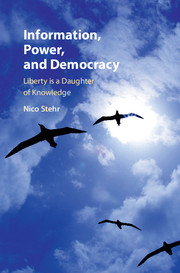Book contents
Introduction
Published online by Cambridge University Press: 05 December 2015
Summary
The advancement and diffusion of knowledge is the only guardian of true liberty.
James Madison (1825:492)The more that deliberation and reflection and a critical spirit play a considerable part in the course of public affairs, the more democratic the nation.
Emile Durkheim ([1950] 1992:89)The relations between information/knowledge and liberties (and therefore democracies) in modern, highly complex, and bureaucratic societies, and their change in the course of more recent history, present us with a multitude of fascinating issues that deserve to be explored more systematically. After all, the relations between liberty and knowledge are not forever fixed. Knowledge or, better, knowledgeability, may serve the resistance of the allegedly weak in society, rather than – as is more often feared – cementing the authority and power of the powerful. This study is about the citizen's exercise of power in the modern era, aside from the power put into effect at the ballot box.
An initial synopsis of the knowledge-guiding interests of my study is best given in the form of a range of broad questions and issues. The main questions I will ask, and issues I will investigate, concern (1) the genealogy of the relation between knowledge and liberties; (2) whether knowledge indeed enhances democracy; (3) the tensions between knowledge and freedom; (4) competing accounts of the process of democratization; (5) whether knowledge should be the operative factor or (6) whether this should rather be knowledgeability; and (7) the sociohistorical context of modern democracies.
The genealogy of the relation between knowledge and liberties
An inquiry into the connections between knowledge and democracy must, of course, critically assess the meaning of the central terms of the inquiry. Neither democracy nor knowledge should be viewed in a transcendental sense. Rather, knowledge and democracy refer to historical phenomena, not found objects. Democracy and knowledge are essentially contested terms. Sensitivity to the various meanings of the core terms of the inquiry is an important form of enlightenment. But one should not dismiss the theoretical and practical utility of these terms out of hand as a result of their essential contestedness. At the same time, it is important to move beyond documenting and describing the contested nature of the terms, and to commit oneself to a particular usage.
- Type
- Chapter
- Information
- Information, Power, and DemocracyLiberty is a Daughter of Knowledge, pp. 1 - 13Publisher: Cambridge University PressPrint publication year: 2015



